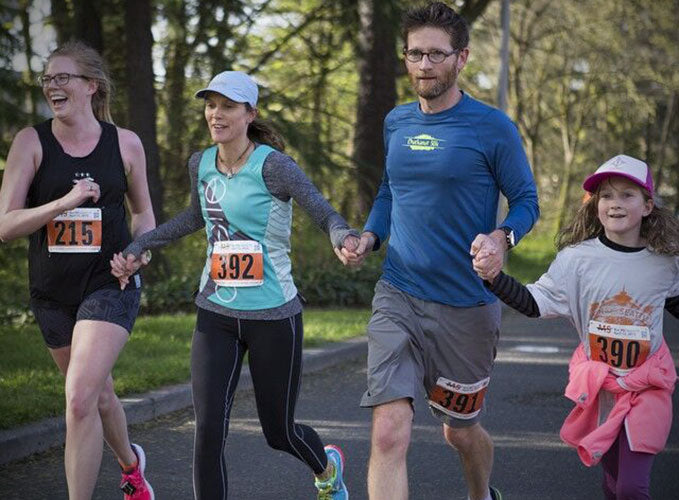Today I am excited to introduce to you another extraordinary team member who also lives, works and runs while contending with Multiple Sclerosis. Portia O’Callaghan’s story is profoundly different from Laura Collins' and yet they share unifying themes of grit, optimism, grace and incredible determination in the face of great challenges. Portia is a mother to a young daughter, works full time as a UX Design Manager and is a gifted musician. Grab a few tissues before you read Portia’s story and prepare to be awed by her persistence, her perspective and perhaps most of all her astounding ability to roll with the punches that MS has dealt her. - Allie Bigelow
I started running in gym class in third grade, and while I ran a few seasons of track and cross-country in high school and college, I was never too serious about it. It wasn't until I was diagnosed with MS in 2004 that I really wanted to be a runner. Faced with the possibility that I wouldn't be able to walk anymore, I knew I wanted to run for as long as I could.

I was diagnosed with Multiple Sclerosis in the emergency room after experiencing weakness in my right leg for a few days. I figured I had a virus, so we went to the hospital. Most people have symptoms for months or years before getting a diagnosis, so my experience was a little different. When the doctor told me I had MS, he cried. I had no idea what MS was and figured I was going to die. When I learned more, I still felt pretty hopeless; based on the first bits of knowledge I gained, it sounded like I was going to be in a wheelchair within a few years, and that image panicked me.
As my diagnosis set in I kept running; not too frequently or quickly, but I ran. After one particularly bad relapse where I couldn't walk very well, I simply got a jogging stroller and used it as a crutch while I jogged slowly on the bike path near my house. I remember telling an acquaintance that I wanted to run a marathon eventually, and she laughed because she thought I was kidding. It just added fuel to the fire.

I’ve only had about four serious relapses in about 12 years, which is pretty good. My version of MS is “relapsing-remitting,” which means I have relapses that I mostly recover from. During relapses, I’ve had vision problems, I’ve been unable to walk or talk, and I’ve had cognitive impairments like forgetting the alphabet. I’ve recovered each time, but the relapse often leaves a little something behind, like a stutter or a limp when I’m tired.
About 3 years after I was diagnosed, we moved to Boston. We lived just a few blocks from the marathon course, and like most people in Boston we didn’t have to go to work on Marathon Monday so we walked down the street to watch the race. I was blown away. I knew right then and there that I was going to run a marathon. I also knew it would have to wait a little while, as my daughter was really young and I was away from her at work most of the day. When I got home after work, I discovered that if I tried to go running, she cried. I felt like I needed to be with her, so the marathon had to wait. I continued to run a few days a week but still didn't race or take it very seriously.

The turning point came in late 2009 after my uncle died of ALS. There was a local 5k that was a fundraiser for ALS and I decided to run it so I found a training program online and followed it. I remember thinking that I was going to run while I still could; after losing my uncle to ALS I really knew that my situation could change so fast. I was out of shape and it was hard, but my MS hadn't progressed very much and I could still do everything I did before my diagnosis. I remember that my right leg kind of flailed around for that first training cycle, but eventually it stopped. Training for and completing the 5k gave me the confidence to start training for a half marathon, and then a marathon. I made every rookie mistake, including overtraining and getting injured, but in 2012 I finally did it: I ran the Providence Marathon. Admittedly it was kind of a disaster, but I was hooked.
I've been an “official” runner for over 5 years now. I've run 2 marathons, a handful of half marathons, and lots of 5ks. The MS hasn’t stopped me, but sometimes it does derail me a bit and force me to change course. Last year I noticed a marked change in my running ability while training for a half marathon. I started experiencing "foot drop" at the end of a long run, which is where my feet slap down on the ground; it gets worse the longer I run and the more tired I get. If I keep running, I often trip and fall. I had hoped it would go away, but it hasn’t, so now when I do longer runs (6-8 miles) I do run/walk intervals. Redefining my experience of running has been challenging, but I can still run.

I'm finding ways to adapt to the changes that MS is bringing. I signed up for a trail half marathon in early 2016 so I could work on running longer, slower miles. I currently can run/walk about 8 miles before I need to stop and sit down for a while, and I'm hoping to increase that to 13.1 miles by the time February rolls around.
My career and my non-running life aren’t affected much by having MS. If I’m not physically exerting myself, my MS isn’t too obvious so unless you see me at the end of a run or a few miles into a hike when my gait looks wobbly you might not even know I have MS. I also slur or stutter when I talk if I am very tired. But I'm lucky that after almost 12 years with MS, I can still do most things I want to do. That said, I am mentally preparing myself for the day when running is no longer an option.

Although I would rather not have it, MS has taught me a lot. I have really good boundaries between work and the rest of my life, and I don't spend time on things unless they are important to me. I spend most of my time with my husband and daughter, because I can’t think of anyone else I’d rather spend time with. I still struggle with eating well (like everyone!) but I've noticed that if I pay attention to what I eat, I feel better.
I think the most important thing about living with a chronic illness is holding tight to hope and having a generally positive outlook. If you listen to what other people say, you might feel like you can't do certain things, or that your life's trajectory will follow a certain path. But no one knows what your life is going to be like, and the best person to dictate your path is you. Keep doing what you want, what you can. Take care of yourself the best way you know how. Sleep a lot, eat whole unprocessed foods (most of the time), and avoid stress. Remember that you have control over a lot of things in your life - maybe not everything, but significant things like your mindset, your diet and exercise habits, and how you spend your time.
Being part of the Oiselle Volée has had a huge impact on my life. I have made many friends and I’ve had so much support from this group of amazing women. For example, when I wanted to focus on 5k training last year, Sarah Lesko taught me a ton about speedwork (and running, and life!) and I got significantly faster. At Birdcamp 2014, Lauren Fleshman lent me her guitar, which brought me back to music after a long hiatus. I recently bought a piano and I play it every day, often twice a day! My roomates from camp (both years), Kimmie Pearlman and Ayesha Sundram, have become very close friends. I could go on like this for a week.

Oiselle is so much more than a clothing company. The Volée is a group of women who support each other, inspire each other, and accept each other. And by accepting each other, we are encouraged to accept ourselves.
So here’s what I’ve learned about running, and I think it applies to most things in life: It doesn’t matter how fast you are, or how many miles you can run. Continuing your relationship with a thing that you love and not forsaking it because it looks different from how you’d like it to look – that is what matters.











